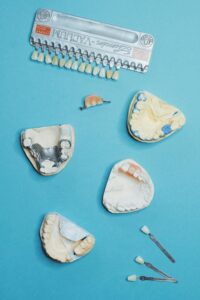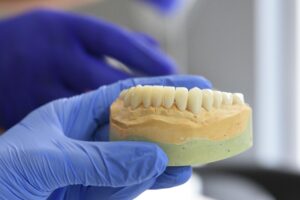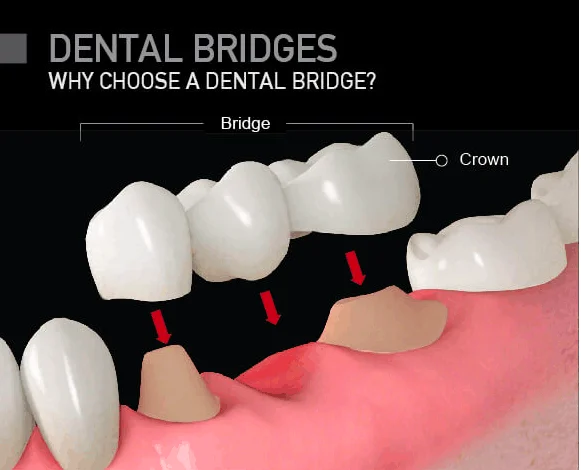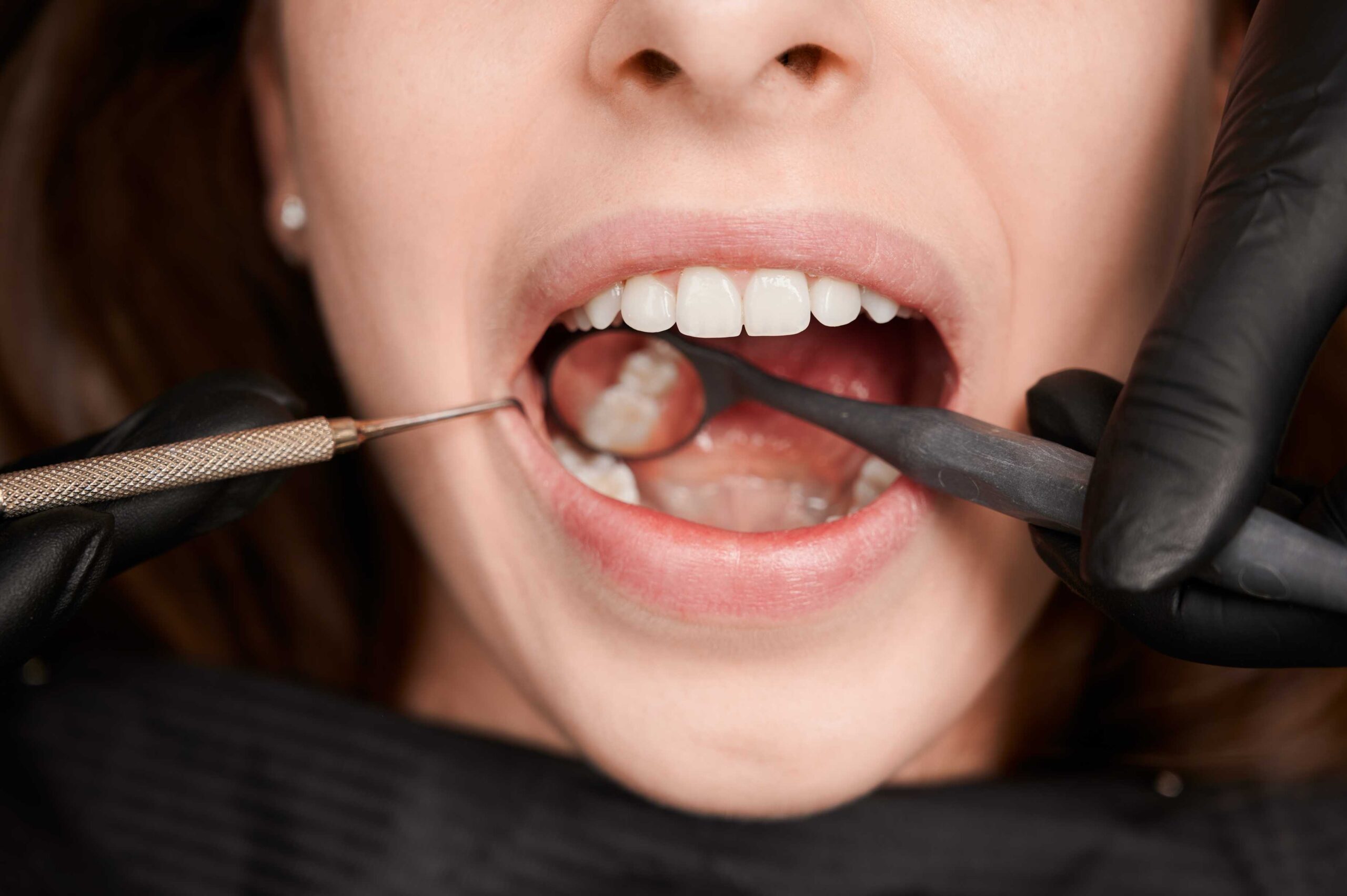Basically, there are four choices for a person who has lost a tooth or multiple teeth, namely leaving the gap as it is, having dentures, having a brid
The Benefits of Dental Implant Treatment
Basically, there are four choices for a person who has lost a tooth or multiple teeth, namely leaving the gap as it is, having dentures, having a bridge or having a dental implant placed. No matter how inconspicuous it is, the first option is not recommended. This is because leaving a gap might result in problems like misaligned teeth over time.
While both bridges and dentures help replace damaged or missing teeth, they both have their own disadvantages. At One two three Dental, our dental implant experts in Guiseley, Leeds believe that dental implants are the best option for most patients. The procedure involves minor surgery with a 3–6-month healing time, this treatment is probably the best long-term solution to replace a missing tooth or restore any number of teeth to improve function as well as complete your smile.
Continue reading as we explore this procedure in depth, along with its benefits.
What are Dental Implants? 
A dental implant is a structure used to replace a missing tooth. In dental implant treatment, the surgeon places a screw-like implant (made of titanium) into the jawbone, which serves as an anchor for an artificial tooth, called an implant crown.
An abutment is used to connect the artificial tooth to the implant. The crown is tailored to fit the individual’s mouth and blended with the natural colour of the rest of their teeth. Crowns mimic the appearance, feel and function of real teeth.
Although dental implants offer dental health and cosmetic benefits over dentures, they are not ideal for everyone. The implant needs to integrate with the bone, so healthy bones are essential before undergoing implant surgery.
Types of Dental Implants
Mainly, dental implant treatment is of the following two types:
- Endosteal (Within the Bone): This is the most common type of dental implant. It comes in various forms, such as cylinders, blades and screws that are surgically inserted into the jawbone. Each implant can support one or more prosthetic teeth. This option is typically suitable for patients who are currently using bridges or removable dentures.
Types of Dental Implant Procedures
Based on your specific condition and the type of implant selected, your dental implant surgeon will design a bespoke treatment plan to meet your specific needs. Here are some potential treatment options depending on your situation:
- Single Tooth Dental Implants: If you are missing a single tooth, it can be replaced with single dental implant treatment.
- Multiple Tooth Dental Implants: If the patient is missing several teeth, multiple dental implant treatment can be used to replace them.
- Full Mouth Dental Implants: If all your teeth are missing, full mouth dental implants are perhaps the best teeth restoration method.
- Sinus Augmentation: The success of a dental implant often depends on the quality and quantity of the bone in the area to be treated. The upper back jaw can be challenging due to limited bone and proximity to the sinus. Sinus augmentation helps by raising the floor of the sinus while developing bone for implant placement.
- Ridge Modification: Deformities in the lower or upper jaw can result in insufficient bone for implant placement. To address this, the gum is lifted to expose the area where bone is lacking, and the space is filled with bone or a bone substitute to build up the ridge. Ridge modification may help with jaw restoration, enhance the appearance of the jaw while increasing the success rate of implants.
Also Read: All You Need to Know about Dental Implant Risks and Complications
Benefits of Dental Implant Treatment
Let us explore some of the most prominent advantages of choosing dental implants replace missing teeth.
- Enhanced Aesthetics: Ready to flash that smile? Dental implants are custom-made to match the colour, shape and size of your natural teeth, seamlessly restoring –or even creating – a beautiful, natural-looking smile.
- Prevention of Bone Loss: Dental implant treatment plays a crucial role in preventing bone loss. When a tooth is lost, the jawbone underneath can begin to deteriorate. Implants stimulate the jawbone, which helps preserve its structure and help maintain the facial shape.
- Improved Chewing Ability: Unlike dentures that can shift or move while eating, dental implants function like natural teeth, helping you to restore full chewing capabilities. This allows you to enjoy a variety of foods without the discomfort or limitations often associated with dentures.
- Support for Adjacent Teeth: Dental implants help stabilise the teeth adjacent to the implant. Without an implant, neighbouring teeth may shift into the gap, causing bite issues and affecting the appearance of your smile. Implants maintain the alignment and integrity of your natural teeth.
- Convenience: Dental implants become a permanent fixture in your mouth, eliminating the need for adhesives or nightly removal, as required with dentures. Plus, there is no risk of them slipping out of the mouth, providing peace of mind and confidence.
- Clearer Speech: Missing teeth or poorly fitting dentures can hinder your speech. Because dental implants are securely attached and customised to your jaw, they allow for more natural speech, thereby improving your ability to communicate clearly and effectively.
- Maintained Bite Strength: Your bite strength depends on the alignment between your upper and lower teeth. Missing teeth can disrupt this balance, leading to jaw discomfort and difficulty chewing. Dental implants, being firmly anchored, allow you to bite with greater force and confidence.
- Enhanced Comfort: Dental implants often provide greater comfort compared to other dental solutions for missing teeth. Being permanently affixed to the jaw, they offer enhanced oral comfort; unlike dentures that might slip or cause irritation.
- Personalised Treatment: Dental implants can be tailored to suit your specific needs. Whether replacing a single tooth or multiple teeth – or supporting an entire arch, implants can be customised to blend perfectly with your natural teeth in shape, colour and size.
- Simplified Oral Care: Dental implants contribute to better oral hygiene. Since they replace individual teeth, each implant can be cleaned just like a natural tooth through regular brushing and flossing. Specific implant cleaning aids are also reccomended when the treatment is complete.
- Long-Lasting Results: While dental implants may require a higher initial investment compared to other options, they come with a success rate of up to 98%. Plus, they can last a lifetime with proper care. On the contrary, dental bridges and dentures might require periodic replacement or adjustment.
Also Read: Unlock Your Perfect Smile: The Benefits of Teeth Straightening Options
Is Dental Implantation the Right Choice for You?
While there are clear benefits of dental implant treatment, it is essential to understand that dental implants are not suitable for everyone. The success of the procedure depends on several factors, including your overall health, oral hygiene and the expertise of the dental implant expert.
Consult with an experienced dental professional at One two three Dental today to determine whether affordable dental implants, bridges or dentures are the best choice for your needs.










